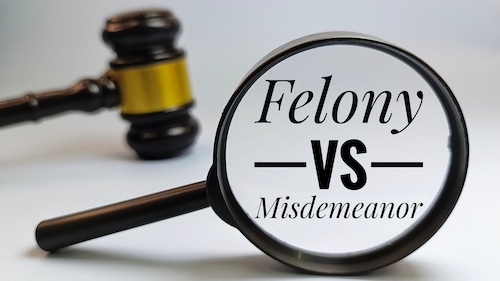Three-Strikes Law in Tennessee: Understanding Its Impact on Your Case
At Byron Pugh Legal, we provide strong criminal defense for individuals facing felony, misdemeanor, DUI, and domestic violence charges throughout Middle Tennessee. Led by Byron Pugh, a former prosecutor with valuable courtroom insight, our firm builds strategic defenses for clients at risk under Tennessee’s strict sentencing laws. In addition to criminal matters, we also assist with family law and related legal issues. Our team is committed to protecting your rights and guiding you through every step of the legal process.
Tennessee’s three-strikes law delivers some of the toughest penalties for repeat offenders in the state’s criminal justice system. A person with two prior felony convictions who faces a third conviction could spend the rest of their life in prison. This law targets violent offenders and habitual criminals, leaving little room for leniency once the third strike occurs. Understanding how this law works is critical for anyone with prior convictions, as one more charge could mean a mandatory life sentence without parole.
In this blog, you will learn how Tennessee’s three-strikes law works, which crimes count as strikes, the consequences of a third conviction, and why working with an experienced Nashville criminal defense attorney is essential if you have prior felony convictions.
What Is the Three-Strikes Law in Tennessee?
Tennessee enforces a three-strikes law that increases penalties for repeat offenders with prior felony convictions. This law applies to individuals convicted of multiple serious or violent crimes.
Statute Behind the Law
The three-strikes law in Tennessee is defined in Tennessee Code Annotated § 40-35-120. It applies to people labeled as persistent offenders, which includes anyone with at least two prior felony convictions for violent crimes. A third conviction can trigger a mandatory life sentence depending on the charges involved.
Purpose of the Law
The law is designed to target habitual offenders who continue to commit serious or violent crimes. It removes flexibility from the court by requiring longer prison sentences for repeat violent offenders. The intent is to protect public safety by imposing stricter penalties on those with a history of violent felony convictions.
Qualifying Felonies
Only certain offenses count as strikes under Tennessee’s law. These include violent felonies such as aggravated robbery, aggravated assault, rape, murder, and certain sex crimes. Felony drug offenses and nonviolent crimes usually do not count unless they are part of a series of felony convictions.
Penalties for a Third Strike
A third felony conviction under the three-strikes law can result in life imprisonment. The law often eliminates the possibility of parole. Repeat offenders may face a mandatory life sentence regardless of whether the third offense is less severe than earlier ones.
Legal Classification of Offenders
The law divides offenders into categories such as persistent offenders and career offenders. A persistent offender has at least two prior felony convictions. A career offender has six or more. These classifications determine whether someone receives enhanced penalties or mandatory sentences under Tennessee’s sentencing law.
What Qualifies as a “Strike” in Tennessee?
Tennessee’s three-strikes law applies only to specific felony convictions that meet the criteria set by the state’s sentencing statutes.
Violent Felonies
Strikes under Tennessee law are limited to violent felony convictions. These include offenses such as aggravated assault, aggravated robbery, kidnapping, rape, and first or second degree murder. A violent felony involves physical force or the threat of it against another person. These crimes are considered serious or violent and are central to how the law applies strikes.
Serious Felonies
Some serious felonies that do not involve direct violence may still qualify if classified under higher felony classes. Examples include certain armed burglary charges, felony sexual abuse, or criminal acts involving deadly weapons. These offenses may qualify based on how Tennessee’s criminal justice system classifies them within its sentencing structure.
Prior Convictions and Pattern of Offending
For a strike to count, the person must have been previously convicted of a qualifying offense. The court reviews criminal history to confirm that prior offenses were both felonies and violent or serious in nature. Multiple felony convictions that arise from separate incidents carry more weight than multiple convictions from a single event.
Juvenile Offenses and Out-of-State Convictions
In some cases, juvenile adjudications for violent felonies may count as strikes if the offense would be a qualifying felony in adult court. Tennessee courts may also count out-of-state convictions if the crime meets Tennessee’s definition of a violent or serious felony.
Exceptions and Limitations
Not every felony conviction qualifies as a strike. Nonviolent crimes such as drug possession, theft under a certain dollar amount, or property damage offenses usually do not count. Misdemeanors never qualify. The law focuses on repeat violent offenders and habitual criminals who commit serious felonies.
The Harsh Consequences of a Third Strike
A third strike under Tennessee’s three-strikes law triggers some of the most severe penalties allowed under state sentencing law.
Mandatory Life Sentence
A person convicted of a third qualifying felony may receive a mandatory life sentence. This applies without regard to the details of the third offense if the first two convictions were for serious or violent crimes. The sentence may exclude parole, requiring the person to remain in prison for the rest of their life.
No Judicial Discretion
Judges have limited authority once the third strike conditions are met. The law removes most opportunities to argue for reduced sentences. This means even if the third felony is less severe than the prior offenses, the court must impose the mandatory sentence. The goal is to ensure repeat violent offenders receive longer prison sentences without exception.
Enhanced Penalties for Career Offenders
Individuals with six or more felony convictions may be classified as career offenders. Career offender status leads to even stricter penalties, including consecutive sentences and higher mandatory minimums. These offenders face little chance of early release or sentence reduction.
Impact on Parole and Sentence Reduction
Repeat violent offenders sentenced under the three-strikes law often lose eligibility for parole. Parole violations from previous convictions may also increase the length of a current sentence. Inmates serving life sentences under this law are rarely granted sentence relief unless a court finds a legal error or a constitutional violation.
Effect on Plea Bargains and Legal Strategy
Prosecutors are less likely to offer reduced charges or favorable plea deals to individuals facing a third strike. The risk of a life sentence forces many defendants to go to trial. This makes early legal action essential. A Nashville criminal defense lawyer can assess whether the previous convictions meet strike qualifications and if there is room to challenge their use in court.
How the Three-Strikes Law Impacts Your Legal Strategy
Facing a third felony conviction in Tennessee changes the legal approach required to protect your rights and freedom.
High-Stakes Legal Environment
The three-strikes law raises the risk level for anyone with two prior felony convictions. A third conviction may lead to a mandatory life sentence. This eliminates many standard legal options and forces a more aggressive and focused defense. Repeat offenders cannot afford mistakes in court.
Importance of Prior Conviction Review
Every prior felony conviction must be reviewed to confirm it qualifies as a strike. Not all previous offenses meet the legal definition of a serious or violent felony. A Nashville criminal defense attorney will analyze the charges, sentencing records, and classification of each conviction to determine whether the three-strikes law applies.
Early Case Assessment
A strong legal strategy begins early. From the moment of arrest, the defense must evaluate the current charge and how it fits into the offender’s history. This includes identifying possible weaknesses in the prosecution’s evidence or flaws in how prior convictions were handled. Acting early can create leverage before the case moves into sentencing.
Plea Bargain Limitations
The three-strikes law limits plea bargain opportunities. Prosecutors are often unwilling to reduce charges when dealing with habitual offenders. This reduces the chances of avoiding a third strike through negotiation. Legal counsel must be prepared to fight the charge at trial or challenge the inclusion of earlier convictions as strikes.
Focus on Strike Defense
A central part of the defense strategy may involve arguing that the current charge or one of the prior convictions does not qualify as a strike. This can include legal motions, statute challenges, or evidence disputes. Excluding one prior conviction from consideration can remove the threat of a mandatory life sentence.
Sentencing Advocacy
If a conviction is likely, sentencing advocacy becomes the next priority. This may include presenting mitigating factors or seeking alternatives within the law. Although the three-strikes law limits judicial discretion, an experienced defense lawyer can still present arguments for sentence reduction under specific conditions.
Contact an Experienced Nashville Criminal Defense Lawyer Today!
If you are facing a felony charge in Tennessee and have one or more prior convictions, you could be at risk under the state’s three-strikes law. A third strike may lead to a mandatory life sentence, with no chance of parole. Do not wait to get legal help. Our team at Byron Pugh Legal understands the serious penalties tied to repeat felony convictions and how to challenge them.
Contact us at 615-255-9595 for a free case consultation today!








